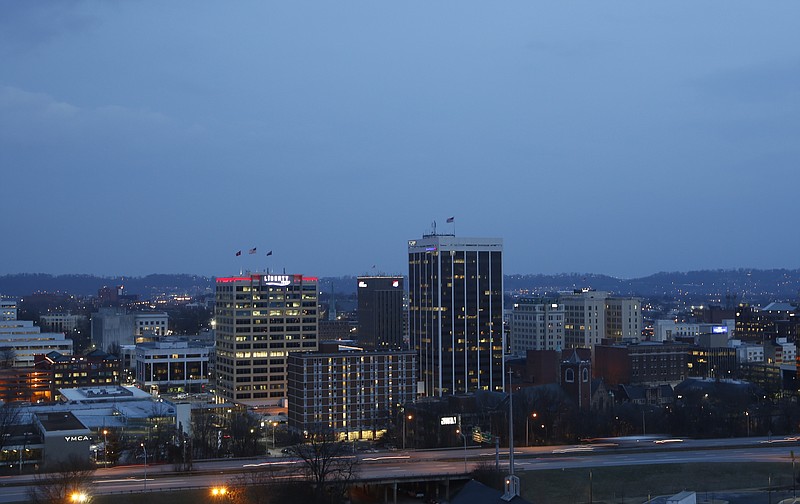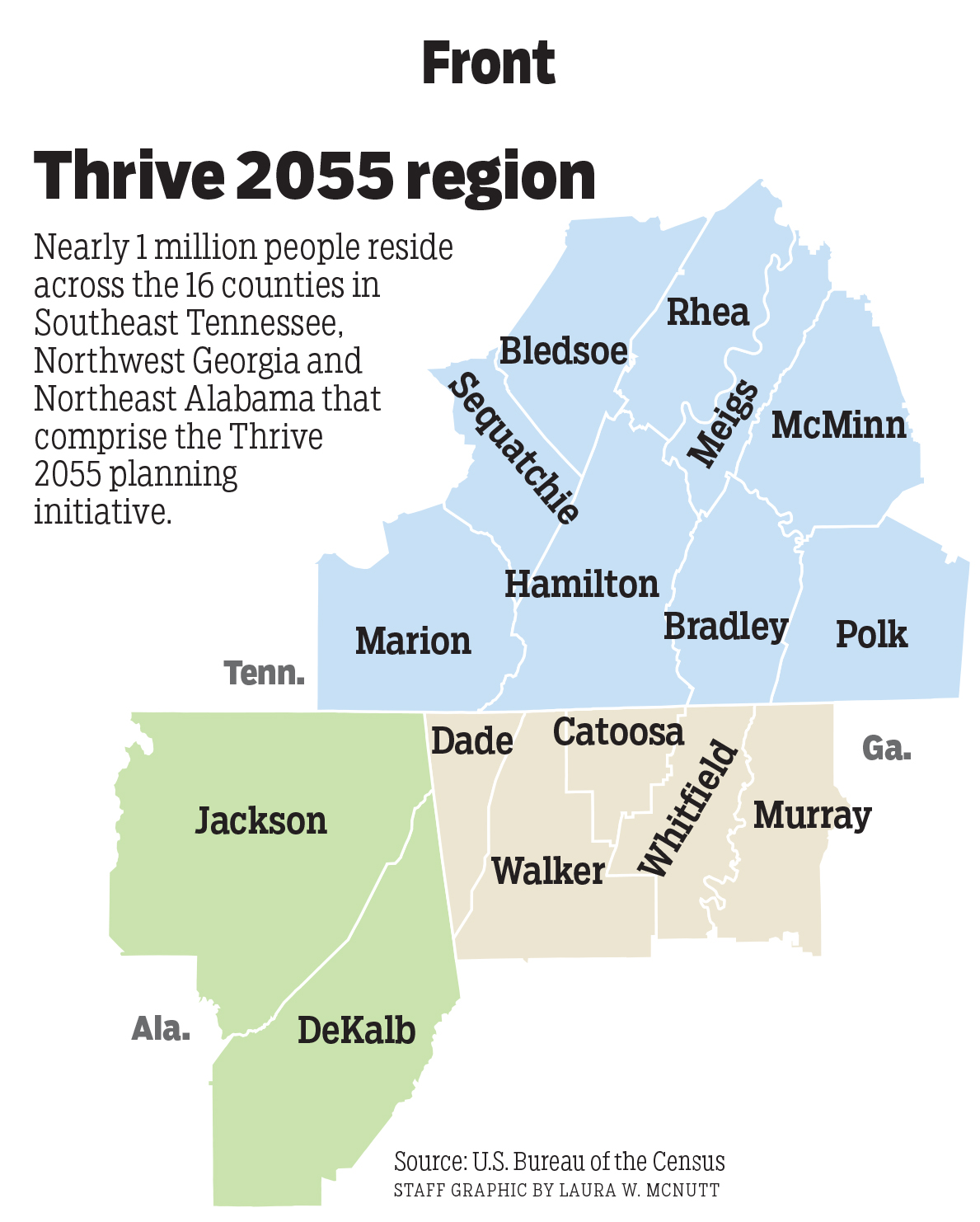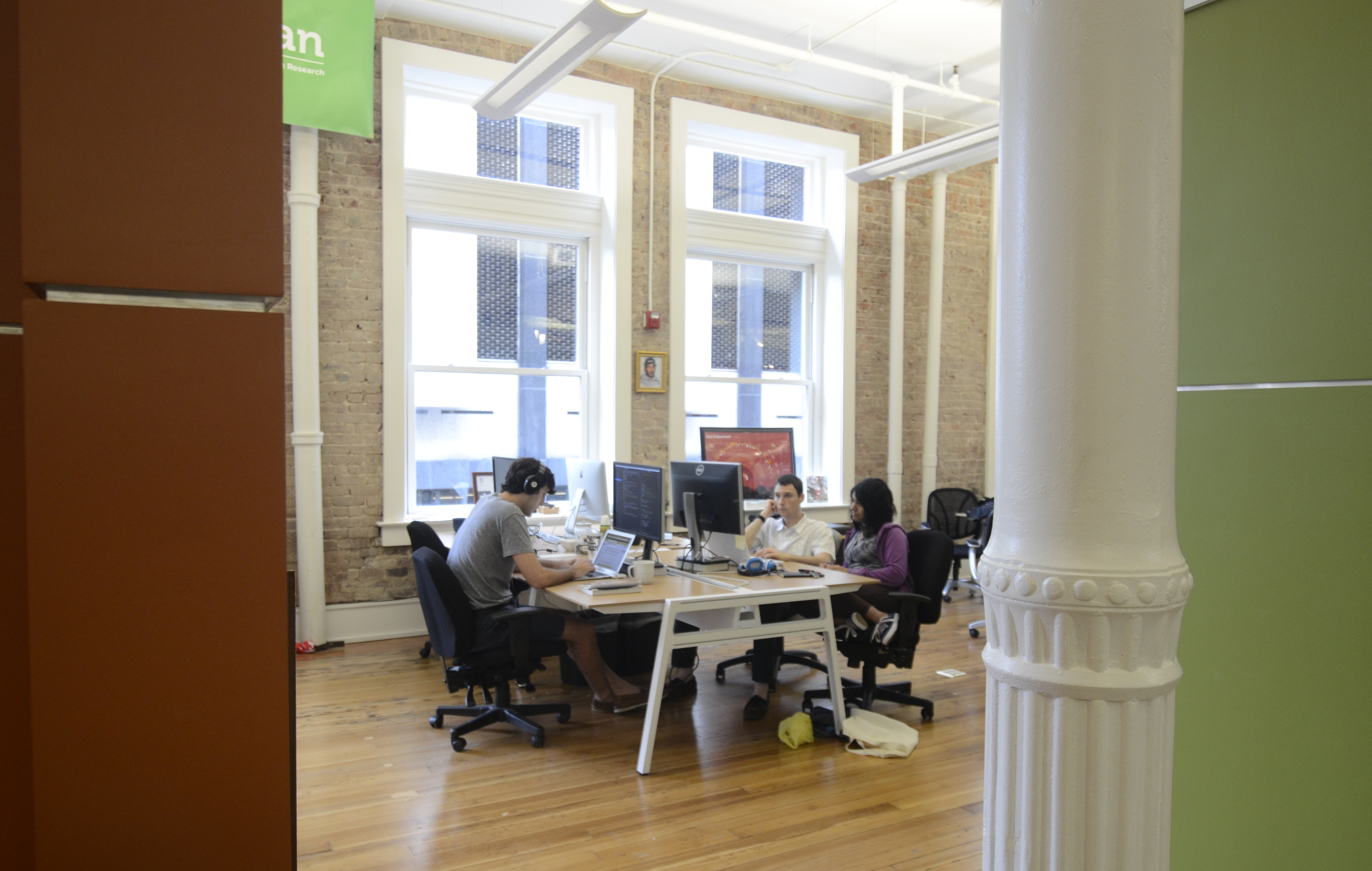People in the Chattanooga region recall the heavy industrial smog that once hung over the city, the stark effects of mining in the Copper Basin and the pollution of the Tennessee River.
But a new survey also shows they see spurring the area's economy as paramount to their future.
The polling of about 1,100 people in the 16-county, three-state area reveals they want the best of both worlds -- a regional economy humming with new jobs but not at the expense of harming the environment.
Thrive 2055, the region's 40-year planning effort that conducted the survey, reached out to people in Southeast Tennessee, Northwest Georgia and Northeast Alabama over the past several months to gauge their feelings on key growth scenarios.
Later next year, after 36 months of work, Thrive planners will issue strategic blueprints to help push the region ahead through 2055.
THRIVE 2055
40-year growth plan 3 states, 16 counties 1 million people 79 municipalities 6,648 square miles Source: Thrive 2055
People who responded in the polling were clear -- economic development is key, but they want to keep the region's so-called "natural treasures," said Bridgett Massengill, Thrive 2055's project manager.
"They value the open space," she said about the respondents, many of whom took part in a series of public meetings in the region.
When it comes to development, people want to use existing infrastructure, the project manager said. They'd support investing in infrastructure for mass transit, biking and walking, the survey showed, and they'd like more urban and in-town housing options to live close to work and leisure activities.
Daniel Carter, a University of the South environmental studies professor, said people want to both protect the environment and promote the creation of more high-paying jobs.
Carter, heading a Thrive 2055 panel, believes that talking about planning regulations in the region isn't the way forward. Rather, he said, natural sites that need protection need be identified and governments should work with land trusts and other organizations to help preserve such properties.
"We don't want to get into a discussion about zoning regulations," Carter said.
A classic example of what potential future development can look like is Enterprise South industrial park in Hamilton County, Thrive officials said. A former 7,000-acre U.S. Army ammunition plant, the site was cleaned up and much of it was turned into space for businesses such as Volkswagen and Amazon, while a large nature park holds walking and bike trails.
Gary Farlow, the Cleveland/Bradley County Chamber of Commerce chief executive, said economic development is compatible with quality of life and the environmental landscape.
What people want
Highest rated possible futures for the region as determined by a Thrive 2055 poll of more than 1,100 people earlier this year: More open spaces, "natural treasures" preserved, agricultural activity and eco-tourism boosted. Business and housing growth in downtowns support existing infrastructure. Investment supports commuting via mass transit, biking, walking. Housing includes more urban options so people can live close to work and leisure. Office and retail lead employment growth. Quality of life attracts young, creative workers. In addition to regional perimeter road around Chattanooga, improvements include bus transit, rail and water freight routes. Source: Thrive 2055
"It's how you balance the interests and protect what we value," he said. "We need to work on both these things."
Farlow, who also heads a Thrive panel, said there's a balance between developing greenfield and brownfield sites.
"You can redevelop some of these [brownfield sites,] but not to the exclusion of new greenfield sites," he said.
Farlow added that survey findings show the region may need a central entity that markets Southeast Tennessee, Northwest Georgia and Northeast Alabama for economic development purposes.
"How do you package this region for companies considering locating here?" he asked. "How do you do that so it's fair to everybody?"
The Cleveland Chamber CEO said an existing group already operating in the region might house such a central resource. Potentially, a code of conduct could be created within the economic development community in the region so one county isn't raiding industry from another and there aren't bidding wars between neighbors, he said.
"It has been done in other parts of the country," Farlow said.
Another issue identified by people in the survey involved transportation in the region.
Thrive planners had earlier cited possible creation of a regional loop road. The 200-mile perimeter highway could circle around Chattanooga, easing bottlenecks in the city, helping area commuters and better connecting cities such as Dalton and LaFayette in Georgia with Cleveland and Dayton in Tennessee.
While there was interest in the loop from the people surveyed, there was also a desire to see improvements in bus transit, rail and water freight.
Carter said that with the region's population slated to grow -- Thrive estimates up to 40 percent to 1.4 million people by 2055 -- finding better means of transportation around the region will be even more important for future growth.
"You've got to do it or it only gets worse," he said.
Farlow agreed, saying it's vital for businesses to get products to and through the region.
"We've got to figure out ways to deal with either a bypass or existing through [highway] issues," he said. "We've got to address those now."
Massengill noted there's no one entity looking at the three-state region's transportation issues now.
"They don't coordinate among states," she said.
Thrive 2055 asked people for feedback on four potential growth scenarios for the survey:
Business as usual -- how the region would grow if current development trends were followed.
I-75 manufacturing corridor -- growth in advanced manufacturing particularly along the interstate with housing following that expansion.
Growing from within -- office and retail lead employment growth, more of the millennial generation are attracted and housing includes added urban and in-town options.
Regional loop, local access -- better east-west transportation in the region connecting all of the area's interstate highways, opening the area up for more growth along that new highway.
The Thrive 2055 growth initiative will craft strategic plans in regional economic development and three other key areas -- education and workforce training, transportation, and natural treasures.
Dan Jacobson, a BlueCross BlueShield of Tennessee executive who is chairing Thrive's coordinating committee, said that hearing from people is critical to developing the long-range plan.
"I firmly believe to the extent that we work together on these big issues, regional success will be ours and, quite literally, the sky's the limit," he said.
Thrive 2055 has a $3.2 million budget. About $3 million has been contributed to the effort so far, with local governments providing over $1.1 million, including $500,000 from Hamilton County and $500,000 from Chattanooga. The other local government contributions are from Scottsboro Ala., and Ducktown, Tenn., Massengill said.
Private foundations from Hamilton and Whitfield counties have contributed over $1.2 million, and businesses and private individuals from nearly all 16 counties have contributed over $600,000 to date, she said.
Contact Mike Pare at mpare@timesfreepress.com or 423-757-6318.



